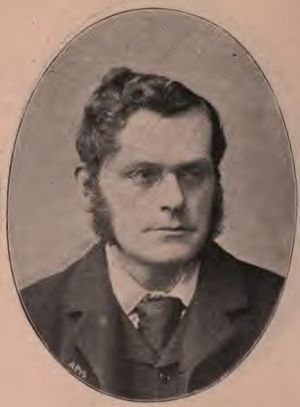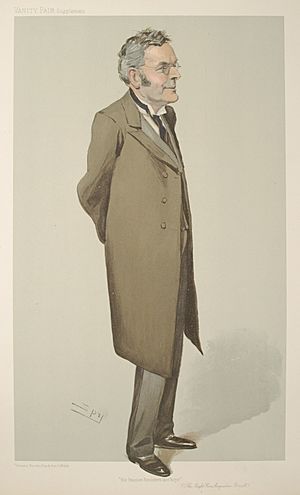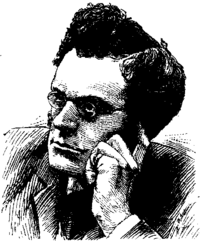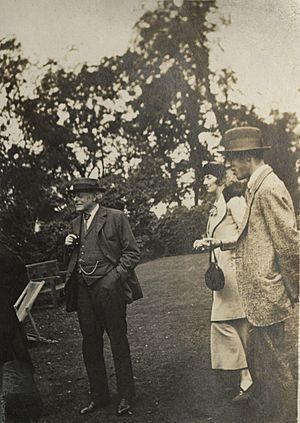Augustine Birrell facts for kids
Quick facts for kids
Augustine Birrell
|
|
|---|---|
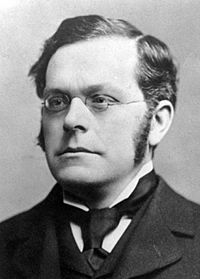 |
|
| President of the Board of Education | |
| In office 10 December 1905 – 23 January 1907 |
|
| Monarch | Edward VII |
| Prime Minister | Sir Henry Campbell-Bannerman |
| Preceded by | The Marquess of Londonderry |
| Succeeded by | Reginald McKenna |
| Chief Secretary for Ireland | |
| In office 23 January 1907 – 3 May 1916 |
|
| Monarch | Edward VII George V |
| Prime Minister | Sir Henry Campbell-Bannerman H. H. Asquith |
| Preceded by | James Bryce |
| Succeeded by | Sir Henry Duke |
| Personal details | |
| Born | 19 January 1850 Wavertree, Liverpool, England |
| Died | 20 November 1933 (aged 83) London, England |
| Political party | Liberal |
| Spouses | Margaret Mirrielees (d. 1879) Eleanor Tennyson (d. 1915) |
| Alma mater | Trinity Hall, Cambridge |
Augustine Birrell KC (born January 19, 1850 – died November 20, 1933) was a British politician from the Liberal Party. He served as the Chief Secretary for Ireland from 1907 to 1916. In this important role, he helped tenant farmers buy their land. He also made it easier for Catholic students to get a university education. However, he faced criticism for not stopping rebels before the Easter Rising in 1916, which led to his resignation. Besides politics, Birrell was a lawyer and a well-known author, famous for his funny essays.
Contents
Early Life and Career
Augustine Birrell was born in Wavertree, Liverpool, England. His father, Charles Mitchell Birrell, was a Scottish Baptist minister. Augustine went to school at Amersham Hall and then studied at Trinity Hall, Cambridge University.
He started his career working in a lawyer's office. In 1875, he became a barrister, which is a type of lawyer who argues cases in court. Later, he became a KC in 1893, a special title for experienced lawyers. From 1896 to 1899, he taught law at University College, London. In 1911, Birrell was chosen as the Lord Rector of Glasgow University.
Birrell was married twice. His first wife, Margaret Mirrielees, passed away in 1879. In 1888, he married Eleanor Tennyson. They had two sons, one of whom, Frankie, became a journalist. Augustine Birrell also became a successful writer. He published a popular book of essays called Obiter Dicta in 1884. His writing style was known for its humor, which people called birrelling.
Starting in Politics
Birrell tried to become a Member of Parliament (MP) several times. After losing elections in Liverpool and Widnes, he was finally elected as a Liberal MP for West Fife in 1889. He kept this seat in the elections of 1892 and 1895. However, in the 1900 election, he lost his seat when he ran in Manchester North East. In 1903, he helped write a book called Eight Years of Tory Government. This book criticized the government at the time for how it handled issues like housing and worker's rights.
Leading Education in Britain
In December 1905, Birrell joined the government of Prime Minister Sir Henry Campbell-Bannerman. He became the President of the Board of Education, which meant he was in charge of education for the country. He was also made a member of the Privy Council, a group of advisors to the King. In January 1906, he was elected as an MP for Bristol North.
Birrell introduced a new law called the Education Bill 1906. This bill aimed to fix problems that some religious groups had with the previous education law. The bill passed easily in the House of Commons. However, the House of Lords, which had many members from the opposing party, made changes that ruined the bill. Because of this, the government decided not to go forward with it. This disagreement between the House of Commons and the House of Lords led to bigger political problems later on.
Since the education bill failed, Birrell could not stay in his role. In January 1907, he was appointed Chief Secretary for Ireland. While in government, Birrell supported new ideas like improving housing, changing land ownership rules, and spending more money on education.
Birrell and Women's Right to Vote
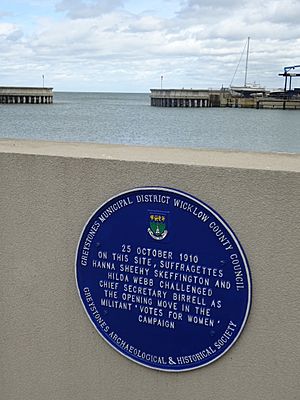
Like many politicians, Birrell did not approve of the strong and sometimes violent actions of the Women's Social and Political Union (WSPU), also known as the suffragettes. In November 1910, a group of suffragettes attacked him near the House of Commons. He wasn't seriously hurt, but he twisted his knee trying to get away.
However, Birrell was also seen as someone who supported women's right to vote. In 1913, he met with a group from the National Union of Women's Suffrage Societies (NUWSS), led by Millicent Fawcett. They discussed what kind of law the NUWSS wanted to see passed to give women the vote.
Chief Secretary for Ireland
As Chief Secretary for Ireland, Birrell worked with Sir Antony MacDonnell. MacDonnell wanted to give Ireland more local control, but this idea faced strong opposition. Birrell tried to introduce a bill called the Irish Council Bill in 1907. At first, Irish leaders welcomed it, but then they changed their minds, and the bill failed. Birrell also faced problems with rising crime in the countryside. Another embarrassing event was the theft of the Irish Crown Jewels from Dublin Castle in 1907, where Birrell had his offices.
Birrell had more success with education and land issues in Ireland. He worked well with both Catholic and Protestant church leaders. This helped him pass the Irish Universities Bill in 1908. This law created the National University of Ireland and Queen's University Belfast. It made sure that Catholic students could get a university education. He also successfully passed the Land Purchase (Ireland) Act in 1909. This law allowed the government to buy large areas of land to help people who didn't have enough.
Home Rule Bill
After a new law limited the power of the House of Lords, Prime Minister H. H. Asquith introduced the Third Home Rule Bill in 1912. This bill aimed to give Ireland its own parliament and more control over its affairs. However, people in Ulster (Northern Ireland), led by Edward Carson, strongly opposed this. They even formed their own army, the Ulster Volunteers, to resist the law. Carson wanted Ulster to be left out of the Home Rule plan.
Birrell did not want any part of Ireland to be excluded. When a compromise was suggested to exclude six counties of Ulster for a few years, Birrell offered to resign. However, the compromise was rejected by both sides, and Birrell stayed in his job. The Home Rule crisis continued until 1914. The bill was finally passed, but its implementation was put on hold because World War I had just begun.
Easter Rising
In November 1913, the Irish Volunteers were formed. They aimed to protect Home Rule but were secretly influenced by a group that wanted Ireland to be completely separate from Britain. In 1915, Birrell's assistant, Sir Matthew Nathan, warned him that extreme Irish nationalists were gaining support. Birrell and other leaders decided not to take strong action against these groups, fearing it might make things worse. Birrell himself thought that a bomb attack was more likely than a full rebellion.
However, his assessment was wrong. The Easter Rising began on April 24, 1916. Birrell was in London when he heard the news. He quickly approved the arrest of the rebel leaders, but the Rising had already started. He traveled to Dublin to see the situation for himself. On May 1, the day after the Rising ended, Prime Minister Asquith accepted Birrell's resignation.
Many politicians, both Irish and British, expressed sadness at his departure. However, a later investigation into the 1916 Rebellion criticized Birrell and Nathan. They were blamed for not taking action against the rebels in the months leading up to the Rising. Birrell later admitted that he did not defend himself strongly enough during this investigation.
Later Life
After resigning, Birrell did not run for election again in 1918. He never returned to Ireland. In 1929, he was given an honorary degree from the National University of Ireland, but bad weather prevented him from traveling to receive it in person.
He went back to writing, publishing more essays and book reviews. He also wrote a book about his father-in-law, Frederick Locker-Lampson. Augustine Birrell passed away in London on November 20, 1933, at the age of 83. His autobiography, Things Past Redress, was published after his death.
Selected Works
- Obiter Dicta, 1885
- Res Judicatae: Papers and Essays, 1892
- Essays about Men, Women, and Books, 1895
- Collected Essays, 1899
- Miscellanies, 1901
- William Hazlitt, 1902
- Eight Years of Tory Government, 1895-1903; home affairs; handbook for the use of liberals London, 1903
- In the Name of the Bodleian, and Other Essays, 1905
- Andrew Marvell, 1905
- Selected Essays: 1884–1907, 1909
- Self-Selected Essays : a Second Series, 1917
- More Obiter Dicta, 1924
- Et Cetera: A Collection, 1930
- Things Past Redress London, 1937
Papers
Many of Birrell's important papers, especially those from his time as Chief Secretary, are kept at the Bodleian Library. This library also has his letters with other political figures like Asquith. Other collections of his letters can be found in places like the British Library and the National Library of Ireland. His family letters are at the University of Liverpool.


